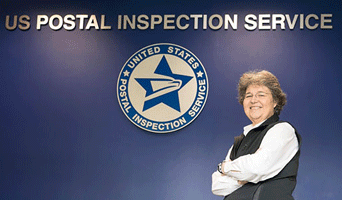The global COVID-19 crisis will require scientists and scholars who are educated and trained to take on the world’s most dangerous problems. The Biodefense program at the Schar School creates leaders in the field.

Stephanie Smith graduated with a master’s degree in biodefense, having studied agroterrorism, virology, biosurveillance and bacteriology, as well as nuclear, biological, and chemical weapons policy and security.
When the U.S. Postal Inspection Service assigned forensic chemist Stephanie Smith to a temporary assignment to support the Security and Crime Prevention Group, one of her first duties was to write the job description of a new “scientific advisor” position.
She was writing the job description of an important job: Whoever worked in that role would enhance the detection of chemical and biological security threats in the mail. The person possibly would be saving lives.
To write the description, Smith needed to learn new things. She realized the position demanded a strong chemistry and bio foundation, but she wanted to expand her knowledge, especially in the area of biodefense.
She found what she was looking for at the Biodefense program at the Schar School. Originally enrolled in a biodefense certificate program, Smith became intrigued by the broader graduate degree program.
“I’m a forensic chemist by training, that’s what I’ve done my entire career,” she said. “I came to Mason to study the ‘bio-side’ of this complex advisor position, but I realized I was also expanding my knowledge beyond science and into the policy side.”
Smith graduated with a master’s degree in biodefense, having studied agroterrorism, virology, biosurveillance and bacteriology, as well as nuclear, biological, and chemical weapons policy and security.
Her capstone project was based on her idea that the method of detecting bioagents in the mail could be improved.
“Stephanie is obviously an exceptionally talented individual,” said Sonia Ben Ouagrham-Gormley, an associate professor in the Schar School’s Biodefense program. “What Mason provided her was a focus on developing a project that can stand the test of academic rigor as well as industry scrutiny.
“The [capstone] course also helped her present her research in a convincing manner. In fact, her management allowed her to conduct an experiment to test her idea.”
The project was successful, yielding experimental results that offer real promise for practical use.
Once Smith wrote the job description for the new position of “Scientific and Technical Advisor, Dangerous Mail Investigations” for the Postal Inspection Service, it was determined there was only one person qualified to fill a job that required knowledge of chemistry, biodefense, security, and public policy.
That would be Stephanie Smith. She got the job.
